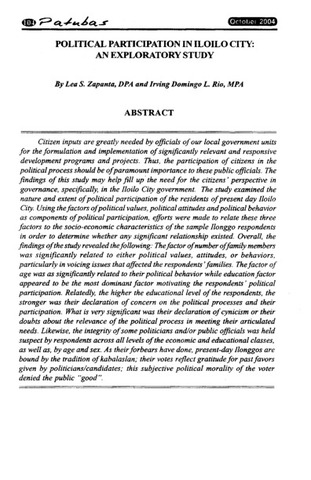Political participation in Iloilo City: An exploratory study
| dc.contributor.author | Zapanta, Lea S. | |
| dc.contributor.author | Rio, Irving Domingo L. | |
| dc.date.accessioned | 2021-03-25T07:56:27Z | |
| dc.date.available | 2021-03-25T07:56:27Z | |
| dc.date.issued | 2004-10 | |
| dc.identifier.citation | Zapanta, L. S. & Rio, I. D. L. (2004). Political participation in Iloilo City: An exploratory study. Patubas, 1(2), 98-124. | en_US |
| dc.identifier.issn | 1908-515X | |
| dc.identifier.uri | https://hdl.handle.net/20.500.12852/692 | |
| dc.description | Journal article | en_US |
| dc.description.abstract | Citizen inputs are greatly needed by officials of our local government units for the formulation and implementation of significantly relevant and responsive development programs and projects. Thus, the participation of citizens in the political process should be of paramount importance to these public officials. The findings of this study may help fill up the need for the citizens ’ perspective in governance, specifically, in the Iloilo City government. The study examined the nature and extent of political participation of the residents of present day Iloilo City. Using the factors of political values, political attitudes and political behavior as components of political participation, efforts were made to relate these three factors to the socio-economic characteristics of the sample Ilonggo respondents in order to determine whether any significant relationship existed. Overall, the findings of the study revealed the following: The factor of number of family members was significantly related to either political values, attitudes, or behaviors, particularly in voicing issues that affected the respondents’ families. The factor of age was as significantly related to their political behavior while education factor appeared to be the most dominant factor motivating the respondents ’ political participation. Relatedly, the higher the educational level of the respondents, the stronger was their declaration of concern on the political processes and their participation. What is very significant was their declaration of cynicism or their doubts about the relevance of the political process in meeting their articulated needs. Likewise, the integrity of some politicians and/or public officials was held suspect by respondents across all levels of the economic and educational classes, as well as, by age and sex. As their forbears have done, present-day Ilonggos are bound by the tradition of kabalaslan; their votes reflect gratitude for past favors given by politicians/candidates; this subjective political morality of the voter denied the public “good.” | en_US |
| dc.language.iso | en | en_US |
| dc.publisher | Central Philippine University | en_US |
| dc.subject.lcsh | Political participation | en_US |
| dc.subject.lcsh | Political and social views | en_US |
| dc.subject.lcsh | Local government | en_US |
| dc.subject.lcsh | Local government--Public opinion | en_US |
| dc.subject.lcsh | Philippines--Iloilo | en_US |
| dc.subject.mesh | Iloilo | en_US |
| dc.title | Political participation in Iloilo City: An exploratory study | en_US |
| dc.type | Article | en_US |
| dc.citation.firstpage | 98 | en_US |
| dc.citation.lastpage | 124 | en_US |
| dc.citation.journaltitle | Patubas | en_US |
| dc.citation.volume | 1 | en_US |
| dc.citation.issue | 2 | en_US |
Fichier(s) constituant ce document
Ce document figure dans la(les) collection(s) suivante(s)
-
Patubas [110]
Patubas is a refereed research journal of Central Philippine University.


